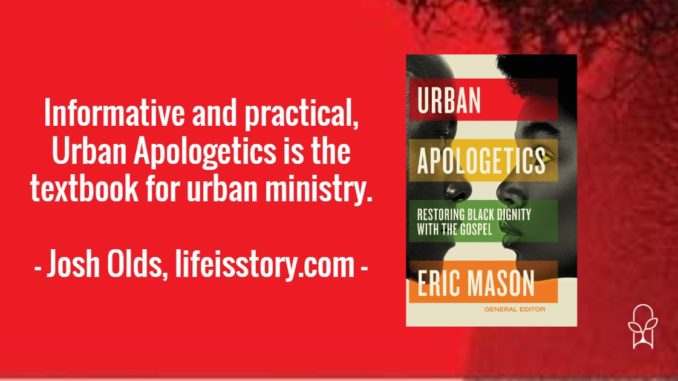
Also by this author: Nehemiah for You: Strength to Build for God
Published by Zondervan on April 6, 2021
Genres: Non-Fiction, Apologetics
Buy on Amazon
Goodreads

African-Americans have long confronted the challenge of dignity destruction caused by white supremacy. While many have found meaning and restoration of dignity in the black church, others have found it in ethnocentric socioreligious groups and philosophies. These ideologies have grown and developed deep traction in the black community and beyond. Previously found primarily in urban communities and conscious Hip-hop songs, now that we are in the Internet age, they have a broader reach than ever. Revisionist history, conspiracy theories, and misinformation about Jesus and Christianity are the order of the day. Many young African-Americans are disinterested in Christianity and others are leaving the church in search of what these false religious ideas appear to offer, a spirituality more indigenous to their history and ethnicity.
Edited by Dr. Eric Mason and featuring a top-notch lineup of contributors, Urban Apologetics is the first book focused entirely on cults, religious groups, and ethnocentric ideologies prevalent in the black community. It brings the church up to speed on the legitimate issues that blacks have with Western Christianity as well as the questions alternative religious groups pose about historic Christianity, and it applies the gospel to black identity to show that Jesus is the only one who can restore our identity.
As a young, white evangelical I read every single book on apologetics I could get my hands on. Not only did I read Evidence That Demands a Verdict, I read the books Josh McDowell cited as well. Norm Geisler. Gary Habermas. Frank Turek. John Lennox. William Lane Craig. Lee Strobel. I read everything they wrote and more. But do you notice anything? Not a non-white perspective to be seen.
While my thoughts on apologetics in general has changed since those younger years, I began to realize that while I could articulate a defense of my faith quite well in certain contexts, the questions I had been trained to answer were no longer the questions that were being asked. Specifically, I had no idea how to engage to engage in apologetics with anyone not white in the suburbs and from the 1990s.
Urban Apologetics is apologetics from the Black perspective. A good portion of the book gives an explanation of certain religious and ethnic identity groups that are popular in the Black community—Nation of Islam, Hebrew Israelites, and Kemeticism—along with discussions of Black feminism, engaging Black men, and the cultural dynamics of Black atheism. The authors are clear in their overviews, providing historical and theological context for each movement, and provide broad suggestions for engaging each group with the Gospel.
The first part of the book discusses the need for a book focused on apologetics in the Black community. Jerome Gay writes an incisive chapter called “All White Everything” that basically describes my own personal experience. Eric Mason, also the editor of the volume, gives a definition of “urban apologetics,” while Tiffany Hill looks to the history of the Black church and the development of apologetics in the church through the decades.
The last part of Urban Apologetics focuses on larger or ancillary issues like philosophy and worldviews (Brandon Washington), the importance of outreach and evangelism (Doug Logan), biblical literacy (Blake Wilson), and spiritual warfare (Eric Mason). It’s a bit of a grab bag, but each essay makes its point well and in a way that fits the contextual theme.
Urban Apologetics is a much-needed volume that addresses the needs of the African-American church in a way that has been ignored for far too long. While the authors are clearly writing to their own communities, there’s a great value for white church leaders to sit back, listen, and learn. I’ve avoided apologetics books for years because it’s all a rehash of the same old stuff. Not this book. Informative and practical, Urban Apologetics is the textbook for urban ministry.
